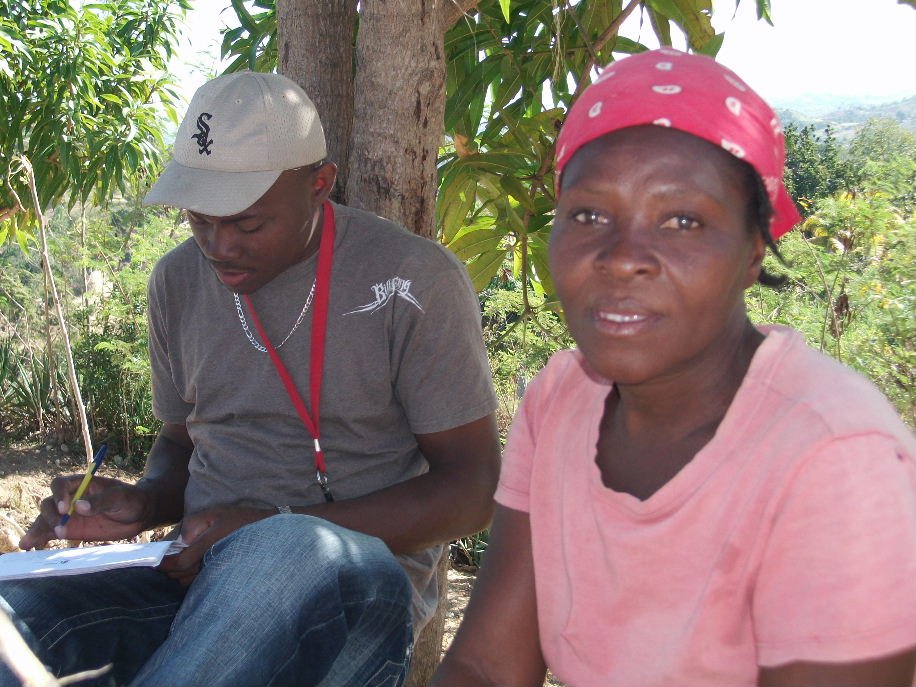Monique has been a CLM member since we brought 300 new families into the program in October. She’s a widow who lives with her children in Danton, a neighborhood of southwestern Sodo that has a very high concentration of CLM members.
I first met Monique in September, during the final verification process. I was the one who visited her home for her interview, and I was struck by what I found. It was midday, and she had not yet been able to provide food for herself or her kids. Nor did they have any prospects for eating later in the afternoon or evening. Their best hope was a little bit of corn a neighbor had given her. She was letting it dry so she would be able to grind it the next day. I wrote about the experience at the time. (See: Final Verification.)
I have been curious to learn about her progress, so I asked Chedlin, her case manager, if I might join him on his rounds.
Her yard was quiet. It was empty when Chedin and I arrived. Her children are now all in school. In September, none were or ever had been. They now attend an inexpensive local community school where tuition is less that $4 per child per year. She pays an examination fee of about $2 more each semester for each kid. These fees had been beyond her means.
This small total is a bigger lump sum than Monique can muster even now, but CLM doesn’t pay it for her. Nor did we ask the school’s leadership to forgive it. The solution was much simpler: We just asked that she be allowed to pay a little bit at a time. The school’s leadership agreed, and the arrangement has been working.
And school attendance means much more than education for her kids, because a large international NGO funds a feeding program at the school. Monique’s kids are thus guaranteed a substantial hot meal everyday in addition to whatever she can offer them at home. Thus they had been hungry, missing meals regularly, or even for days at a time, because Monique was unable to make a $4 lump-sum payment for each of them. And their hunger meant so little to those around them, it was such an invisible part of that community’s life, that there was no one to help Monique ask for a payment plan.
She’s managing her new assets well. Her two goats have both had kids, and her pig is pregnant.
More importantly, she’s been buying chickens with her own money. Some of that money comes from the travel allowance we gave her during her six-day enterprise training. (She walked rather than spending the money on travel.) Some of it she saves from her weekly subsistence allowance. What matters is that this is money she’s accumulated by her own careful spending decisions. Her three chickens are laying eggs that she and her children can eat or sell. She also can hatch some of the chicks and raise them for meat or sale or just add them to her stock. And she’s managed to do all this while contributing much of her subsistence allowance – at first half, but now two-thirds – to a sòl, a savings club.
She uses most what she gets out of her subsistence allowance on her kids’ schooling. That’s how she spent the money she got the first time it was her turn to collect the money from the sòl, and she continues to make payments. She has learned to buy some basic food items in large quantities, which saves her a lot of money. And though she has stopped hiring herself and her boy out as farm laborers, she does sharecrop, which helps her keep food on the table.
Monique isn’t out of the woods yet. Though she is doing a good job developing her assets, her cash flow is still weak. The day I visited with Chedlin, she had not been able to feed her kids before they went to school. The fact that they would get a meal there might make this seem less urgent, but it’s not what we want. Or, more importantly, what Monique wants either. She was waiting anxiously for Chedlin’s arrival, because she was counting on the subsistence allowance he would bring to buy something she could serve them for supper and then for breakfast the next day.
But she has time. She’s been in the program for only about four months, and has two months of weekly subsistence allowance and fourteen months of weekly visits ahead of her. The next time it’s her turn to receive the sòl, she’ll use the money to establish a small commerce, which will strengthen her ability to bring in small amounts of money every day. She’ll also add a pair of turkeys to her livestock. They are vigorous, reproduce well, and are very much saleable.
Given what she’s been able to do thus far, her prospects seem very good.

//Monique and her case manager, Chedlin.//